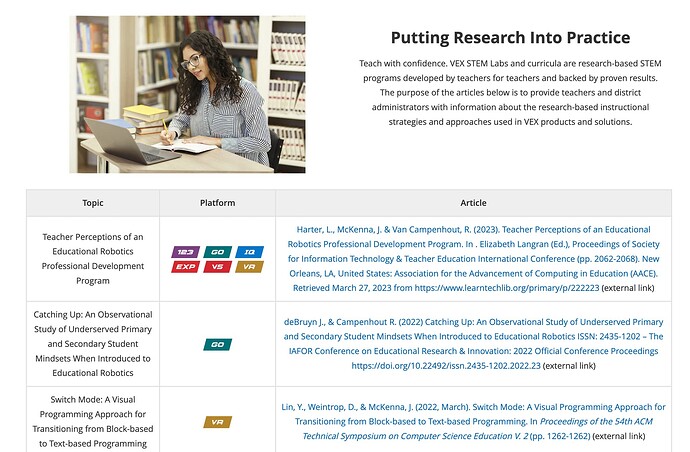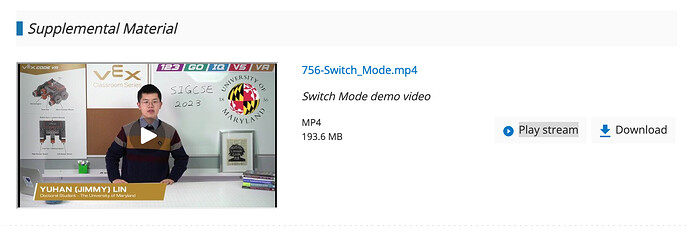Hello all! Thanks Aimee for sharing those  I just wanted to continue with this thread as we are always conducting research and adding new papers to Research.vex.com.
I just wanted to continue with this thread as we are always conducting research and adding new papers to Research.vex.com.
I wanted to note that there are three new papers that I specifically wanted to mention.
- Teacher Perceptions of an Educational Robotics Professional Development Program
Abstract: Educational robotics is a highly effective teaching and learning tool that fosters interdisciplinary STEM learning, positive perceptions of STEM, and strengthens valuable 21st century skills. However, for students to engage these benefits most effectively, teachers need to be well trained in the implementation of robotics in their classroom. Continuing professional development can serve to train current teachers as formal pre-service education programs begin to incorporate educational robotics into their curriculum. In this paper, we investigate teacher’s perceptions of the VEX robotics teacher certification courses. The 491 teachers who responded to a survey reported on their prior experience with robotics, as well as their confidence and knowledge after completing the courses. Analysis identified differences between teachers with no prior experience teaching STEM, as well as between male and female teachers. Future research related to these findings and directions for teacher training are discussed.
VEX resources studied in this research: the various certification courses.
- Catching Up: An Observational Study of Underserved Primary and Secondary Student Mindsets When Introduced to Educational Robotics
Abstract: Student attitudes toward STEM subjects decline as they progress through primary and secondary school, making interventions even more critical for students in these age groups. Integrating educational robotics into the classroom has been shown to increase student perceptions of STEM topics while also having many other positive learning benefits such as increased mastery of STEM concepts and STEM degree achievement. Furthermore, research on mindset in school-aged children found that students who held growth mindset beliefs had higher learning outcomes, persistence, and self-esteem compared to students who held fixed mindset beliefs. In this observational study, an educational robotics curriculum was implemented across grades 3–8 in an urban private school consisting primarily of underserved, minority students. The same robotics kit was used across all ages with differentiation in the STEM labs taught to different ages. The technology teacher—the principal investigator for this study—recorded results from a growth mindset survey and journaled about student reactions to the robotics curriculum as the school year progressed. Observations about student prior experience, attitudes, self-beliefs, and mastery are used to draw insights on the effects of educational robotics for underserved student populations. As the body of research on STEM learning through educational robotics expands and robotics increasingly becomes considered a standard in primary and secondary education, it is critical to consider the needs of students encountering robotics for the first time and how to support and grow their attitudes and mindsets.
VEX resources studied in this research: VEX GO, more specifically GO Builds from build instructions as well as free-building.
- Switch Mode: A Visual Programming Approach for Transitioning from Block-based to Text-based Programming
Abstract: Switch mode is a novel block-based programming feature that allows learners to author one or more lines of text-based code inside of a block-based program. The design of Switch mode seeks to support novices in authoring text-based code while keeping the scaffolds of block-based programming present. Switch mode blocks can be used like any other block but instead of specifying a specific behavior. Switch blocks have a text-based programming editor embedded with it to type in commands. In Switch mode, users can convert conventional blocks to Switch blocks or start from blank Switch blocks to immediately begin typing Python commands. Predefined Switch blocks support single line commands, multi-line programs, variables, nested structures, and function headers. This demo introduces the switch mode approach and will provide a hands-on tutorial on how to author switch mode programs. The session will also share a case study showcasing the potential of switch mode using data from in a 9th grade classroom study. This demo session will introduce attendees to a new and novel approach for helping novices transition from block-based to text-based programming and provide opportunities for hands-on exploration of the tool alongside discussions of how it might be used in classrooms.
There is an associated video with this paper found on this page.
VEX resources studied in this research: Switch Mode in VEXcode VR.
All of this research is extremely important as we continue to develop our educational materials to be as helpful and accessible as possible for teachers and students using VEX. I will continue to post new research as it is published and if you have any questions or want to discuss this research further, please ask! 


